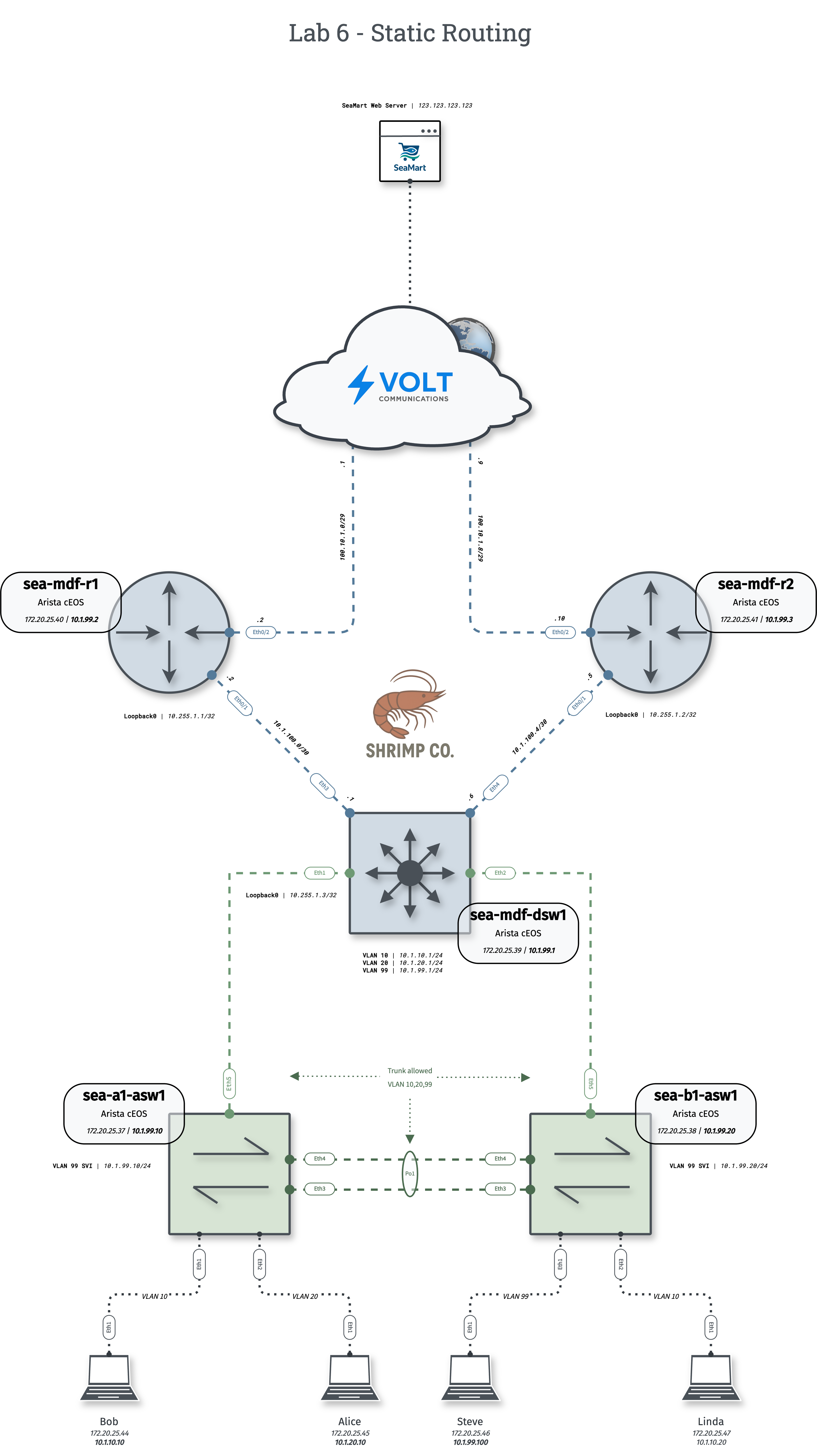
#
Lab 6 - Static Routing
Shrimp Co. needs centralized routing and improved NAT efficiency. Configure distribution layer gateways with static routes and dynamic NAT for scalable internet access.

Tip: Individual topology files are available in the diagrams folder on my Github
#
Configuration Tasks
#
1. Layer 2 Configuration
Ensure trunk links, VLAN databases, SVIs, and port-channels are configured across the switches and connected to sea-mdf-dsw1. VLANs 10, 20, and 99 should have Layer 2 reachability to the DSW.
#
2. Distribution Switch Configuration
- Configure the following SVIs on
sea-mdf-dsw1:- VLAN 10:
10.1.10.1/24 - VLAN 20:
10.1.20.1/24 - VLAN 99:
10.1.99.1/24
- VLAN 10:
- Configure Eth3 & Eth4 as routed interfaces according to the diagram.
- Configure a default route that uses
sea-mdf-r1Eth0/1 as a next-hop. - Configure a secondary default route that uses
sea-mdf-r2Eth0/1 as a next-hop with an administrative distance of 10.
#
3. Router Configuration
- On
sea-mdf-r1andsea-mdf-r2, add static routes tosea-mdf-dsw1for each subnet/VLAN. - Configure loopback and routed interfaces according to the diagram.
- Configure dynamic NAT to choose from a pool of addresses (not PAT/overload).
Specify the exact source subnets in your access list.
Emulator Quirks
When I ran through this lab myself I struggled to get dynamic NAT working as intended until I applied my NAT access-list inbound on sea-mdf-r2 Eth0/1, because I wanted to see ACL hits as a sanity check. Pings immediately started going through even after removal of the ACL. This is not behavior you'd see on a real router and a good reminder that these emulated environments can be goofy.
#
Success Criteria
- Layer 3 Reachability:
- All hosts can ping the SeaMart web server (
123.123.123.123).
- All hosts can ping the SeaMart web server (
- Dynamic NAT:
- NAT translations occur correctly and can be confirmed on both routers with
show ip nat translations.
- NAT translations occur correctly and can be confirmed on both routers with
- Extended ACL:
- Implement an ACL on VLAN 10 & VLAN 20 SVIs that denies hosts in those VLANs from SSHing outside of their own subnet, but allows all other traffic.
- Validate by attempting to SSH from Bob or Alice to
Loopback0onsea-mdf-r1.
- Local Linux Name Server Configuration:
- Edit
/etc/resolv.confon Linux hosts to use8.8.8.8as a nameserver. - Validate with
curl http://seamart.com.
- Edit
- IP SLA Failover:
- Configure IP SLA so that internet-bound traffic takes the path through
sea-mdf-r2if100.10.1.1is unreachable.- Verify the gateway of last resort changes on
sea-mdf-dsw1after issuingshutdownon Eth0/1 onsea-mdf-r1.
- Verify the gateway of last resort changes on
- Configure IP SLA so that internet-bound traffic takes the path through
#
Verification Commands
# NAT translations
show ip nat translations
# NAT statistics
show ip nat statistics
# Check static routes
show ip route
# Check NAT interface configuration
show run interface Ethernet2# Routing table
show ip route
# Interface and SVI status
show ip interface brief
# Show configured routes in the running configuration
show running-config | include route# Web test
curl http://123.123.123.123
# DNS test (if configured)
nslookup seamart.com
# Network trace
traceroute 123.123.123.123
#
Questions to explore
- How does the router know which inside addresses to translate when using dynamic NAT with a pool?
- If you add a new VLAN to the network, what changes are required to allow internet access?
- Why is default route through R1 preferred over R2?
- What are some pitfalls you can imagine with the use of static routes?
- curl seamart.com and check your NAT translations. What are the differences between the addresses in the output? +++
